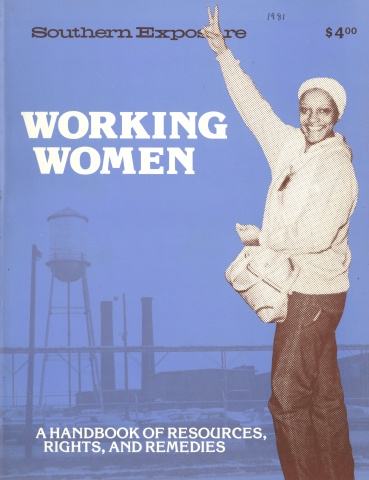
This article originally appeared in Southern Exposure Vol. 9 No. 4, "Working Women: A Handbook of Resources, Rights, and Remedies." Find more from that issue here.
The following article contains references to sexual assault.
When homemakers are forced into the labor market, the transition is often rough. Displaced homemaker programs offer vital services and support.
Kentucky: Creative Employment Project
by Daña Alder
Daña Alder is a program analyst for CEP. She has been a feminist activist for about seven years.
Pat Travis is 25 years old. She was married when she was 17, and has two children, seven and six. She and her husband tried through eight years of counseling and separations to make their marriage work, but have recently decided that divorce was the best solution for everyone.
Faye Eagle is 50 years old, has been married for 32 years and has four children, now ages 19 through 31. Her husband was a truck driver until 1973, when an injury and a series of subsequent heart attacks left him disabled and for a number of years confined to a bed. So, after about 20 years of not working outside the home, Faye had a family to support and a job to find.
Eva Wheatley is 39 years old; she separated from her husband of 10 years when she discovered he had been sexually molesting their 16-year-old daughter for the entire time they were married. She is getting a divorce, and she and her daughter are helping the state prosecute for rape.
In spite of differences in individual circumstances, these women share the common bond of being “displaced homemakers.” Each has devoted most of her energies over a significant number of years to unpaid work in the home, and has been dependent on someone else for income. Now that income has been lost, and these women, along with thousands of others, are having to face an unsteady job market to support themselves and their families, many for the first time in their lives.
Typically, the displaced homemaker is between the ages of 35 and 64, though rural displaced homemakers tend to be younger. And, though she may have organized Girl Scout cookie drives, church suppers for 250, volunteered in a hospital, school or library, or been a Democratic precinct captain, she also typically will tell you she has no skills — she is “just a housewife.”
In recent years, programs have begun throughout the country to help displaced homemakers get ready for the job market. The YWCA Creative Employment Project (CEP) in Louisville, Kentucky, has served about 250 women, including the three mentioned above, since January, 1980. In workshops and through counseling, skills acquired in the home are translated into “marketable” skills and the displaced homemaker may begin to have a different sense of her self.
Faye Eagle says, “I came to the Workshop — found out more about myself in those two short weeks than I had in my lifetime up to this point. I found out I was employable and unemployable at the same time. We were taught ... to use our homemaking skills to an advantage and to use the experience we had to the best advantage. It gave me the incentive to get my GED and the confidence to be placed in Work Experience.” The Work Experience Program [funded through CETA] allows participants to rotate though actual jobs in their area of interest for 60 days. They can be paid the minimum wage for up to 1,000 hours through these rotations, and the program is used to upgrade skills, to give displaced homemakers current working experience and to let them try out a particular field before pursuing a training program.
After years in the home, answering to everyone else’s needs and wants while being economically dependent, the homemaker who must find employment often has problems with a low self-image and with learning how to make choices with herself in mind.
But, as she meets other women like herself and goes through exercises such as skills assessment and vocational interest tests, she begins to learn that she does have choices — that she can set a goal and work towards it. (A skills assessment involves using a checklist to translate skills used in the home into marketable skills: for example, making a dress from a pattern is similar to reading a blueprint.)
“I learned the different opportunities open to me, such as education,” Pat Travers said. “I plan to be a nurse. I’ve learned the steps to get there, such as going to school to be a nurses’ aide, to see how well I do in the medical field and to help pay my way later when I go back to school for a degree in nursing.”
CEP’s Displaced Homemaker Program serves women in Louisville, Jefferson County and the six rural counties surrounding Jefferson. The Jefferson County program began as a national demonstration model funded under CETA, but one of the first acts of the Reagan administration was to eliminate the CETA provisions which funded many displaced homemaker programs. CEP staff decided to make sufficient cutbacks in the overall program to carry the Displaced Homemaker Program through the year, and submitted a combined proposal to CETA for the next year.
It is estimated that there are at least four million displaced homemakers throughout the country. Less than 10,000 of them had been served by organized programs before the programs were defunded.
For women who have been served, or who are being helped by those programs that have managed to stay alive, an organized program such as CEP’s can make a difference.
“I was about at the end of my rope,” Faye Eagle said. “I’d reached the point where I just didn’t care anymore, and I didn’t think I could do anything to make things any different. But now I look at things in a whole new way. My confidence in myself has grown, and I know that I can handle just about anything.”
North Carolina: Choices
By Candy Hamilton
Candy Hamilton is a producer of public affairs programming at WVSP radio. This article is excerpted from a longer interview broadcast on that station.
The North Carolina Council on the Status of Women established local Career Development Centers for Displaced Homemakers in September, 1979. Eligible displaced homemakers who are often in personal crisis situations can enroll in small classes to learn about themselves and how they can translate their homemaking skills into marketable job skills. Participants are paid for attending the six-week sessions, which consist of four weeks of classroom training and two weeks of subsidized job search.
Jane Ball-Groom and Janice Moore are associate directors of the center in Oxford, North Carolina.
Jane Ball-Groom: A lot of these women had spent their young adulthood at home raising the children, taking care of the home. A lot of them did not have time to continue their education, to finish their education. They do not have the knowledge of what a job market is all about. They have a lot of emotional problems that need to be dealt with. They have suffered the loss of their spouse. They are women in their early twenties to their late sixties. These women are faced with “How can I work? How can I find a job?” The Career Development Center enables them — is a way, a tool to deal with themselves psychologically, emotionally and vocationally.
The program is comprised of a seven-week training course. The first four weeks mainly deal with the building up of their emotional strength. Janice heads the classroom activities, which pretty much involve getting that woman to face herself. She gets into the why and why-nots of her life. She learns to be assertive (as opposed to aggressive). She learns what her skills are and she brings them out. She learns to look at herself and say to herself, “You are an OK person!” The next two weeks consist of a job search. By this time, she knows what kind of field or endeavor she wants to get into. Finally there is the placement and follow-up phase.
The women receive an average stipend of $3.35 an hour to attend our classes. They are in class for five hours per day. We also pay mileage. So for a woman who wants to get ahead, who wants to find out about herself, we help her get started.
Janice Moore: The center also provides a system of support, a support network for the emotional traumas they are experiencing during this transition. Not to underplay the situation, these women have lived somewhat comfortably according to their standards. Regardless of what socio-economic background they come from. And all of a sudden they are not going to live that way anymore and that is a very traumatizing experience.
A large percentage of the women that come into our program are already on the incline. They want to make some changes and want to get into one of the primary focal points of the program, that is, elevating their self-esteem and taking charge of their lives. Through testing, creative activities and discussions, the women find ways to get themselves together.
Ball-Groom: Take the displaced homemaker in her 40s and 50s. Twenty years ago it was not necessary to finish high school, which puts her in a dilemma today. There are women that come to us at 47, 53, 65 who want to get a high school diploma — without it they are not placeable in the job market. They don’t have the experience except that of working in the home, and without the diploma it is difficult for them to find a job.
High unemployment is compounding the problem. Jobs are hard to find wherever you go. What we try to do at the center is to match careers with the individual’s skills, personal interests and abilities. We just do not direct them into a job per se, but into a career. If a woman is interested in children and has a way with them, we talk about possibilities in education. If the experience of caring for an ailing parent or grandparent suggests it, we direct the woman to a health career. That’s a field that is lucrative as far as employment possibilities are concerned. So even though the unemployment rate is high, there are still places for women to work, if we can get them to pursue these areas with opportunities.
Moore: Women need these programs because we are the misbegottens. Women have traditionally caught it. Some strong women come to us and say, “I was just a housewife, I never did anything.” However, they have taken care of children, been harmonizers, mediators, taken care of husbands, cooked, managed to organize their lives so they could accommodate several other people. We have a tendency not to see our own self worth. It has been smothered through a number of other roles we have played that were expected of us.
Tags
Southern Exposure
Southern Exposure is a journal that was produced by the Institute for Southern Studies, publisher of Facing South, from 1973 until 2011. It covered a broad range of political and cultural issues in the region, with a special emphasis on investigative journalism and oral history.


